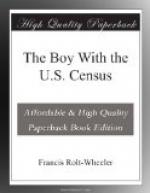“What’s the difference?”
“There is a wide difference. You can see that it would be easy enough to arrange that machine so that if a wrong combination of contacts were made the bell would not ring. Such wiring might be highly complex, but you see the idea is simple. For a right group of contacts, all the wires are satisfied, as it were, and the bell rings; for an error, one wire, cut in on by a wrong wire, breaks the contact, and the bell does not ring.”
“But what do you mean by a wrong grouping?” asked the boy.
“You ought to be able to guess that,” the chief said reproachfully. “For instance if a card is punched ‘Wf’ for Wife and also is punched ‘Male’ that card is sure to be wrong, and if ‘Emp’ for employer is punched on the same card as an age punch showing the person to be a three-year-old youngster, the card is wrong. There are twenty-three different possibilities of error which are checked by this verification machine, and for any one of these twenty-three reasons a card is thrown out.”
“For example if ‘Na’ for naturalized is punched on the same card as ‘N’ for native-born, and things of that sort, I suppose?” the boy questioned.
“And many others of similar character,” the older man agreed.
“But how about insufficiently punched cards?” queried Hamilton. “I can see that it would be easy to arrange the wires so as to catch really bad inconsistencies, but supposing a figure were only left out, there would be no contact made to show the error.”
“Except in the age column,” was the reply, “there is supposed to be a punch in every field and only one. Any field which does not have a contact from every card registers its disapproval by throwing out that card.”
“And what happens to the rejected cards?” asked Hamilton, with interest.
“A checker-up compares them with the original schedules, and if incorrectly punched, punches a new card, if only insufficiently punched, punches the missing place. But the number of cards found wrong does not reach a high percentage.”
“You know I’ve been thinking,” Hamilton said thoughtfully, “that while I suppose it is all right getting all those holes punched in a card, and so forth, I should think it would be fearfully hard to handle the card afterwards. All these little holes look so much alike.”
“To the eye, perhaps,” the chief said, “but you must remember that these cards are never sorted by eyesight. And you must remember that the sorting process is done by machinery all the way along, just as the verifying and the tabulating is handled in a purely mechanical fashion. You remember that each card was punched with a gang-punch?”
“Of course,” the boy said, “that was to specify the district.”
“We keep all those together from the time they are punched till after we are through with the verifying, so that all the cards of a certain enumeration district, and of every section in that district, are kept together in a separate box.”




